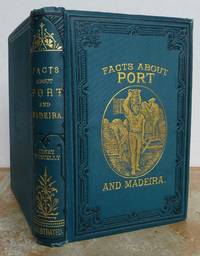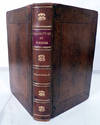
Fieldings Works. Ten Volumes.
by Henry Fielding
- Used
- very good
- Hardcover
- Condition
- Very good
- Seller
-
Scarborough , North Yorkshire, United Kingdom
Payment Methods Accepted
About This Item
1784. new edition. Very good. 15 22 4. Tan leather bindings. Red title plate with gilt decoration and lettering on the spines. Spines are all a bit tired. A little board damage on a few.
The Works of Henry Fielding, Esq, A New Edition in Ten Volumes.
If the binding was in better condition a price of £3,500.00 could be sought: that said F.B.A. would meticulously restore this edition for a further £600.00 British pounds.
Henry Fielding (22 April 1707 – 8 October 1754) was an English novelist and dramatist known for his earthy humour and satire. His comic novel Tom Jones is still widely appreciated. He and Samuel Richardson are seen as founders of the traditional English novel. He also holds a place in the history of law enforcement, having used his authority as a magistrate to found the Bow Street Runners, London’s first intermittently funded, full-time police force.
The Theatrical Licensing Act of 1737 is said to be a direct response to his activities in writing for the theatre. Although the play that triggered the act was the unproduced, anonymously authored The Golden Rump, Fielding’s dramatic satires had set the tone. Once it was passed, political satire on stage became all but impossible. Fielding retired from the theatre and resumed his legal career to support his wife Charlotte Craddock and two children by becoming a barrister, joining the Middle Temple in 1737 and being called to the bar there in 1740.
Fielding’s lack of financial acumen meant the family often endured periods of poverty, but were helped by Ralph Allen, a wealthy benefactor, on whom Squire Allworthy in Tom Jones would be based. Allen went on to provide for the education and support of Fielding’s children after the writer’s death.
Fielding never stopped writing political satire and satires of current arts and letters. The Tragedy of Tragedies (for which Hogarth designed the frontispiece) was, for example, quite successful as a printed play. Based on his earlier Tom Thumb, this was another of Fielding’s irregular plays published under the name of H. Scriblerus Secundus, a pseudonym intended to link himself ideally with the Scriblerus Club of literary satirists founded by Jonathan Swift, Alexander Pope and John Gay.He also contributed several works to journals.
From 1734 to 1739, Fielding wrote anonymously for the leading Tory periodical, The Craftsman, against the Prime Minister, Sir Robert Walpole.His patron was the opposition Whig MP George Lyttelton, a boyhood friend from Eton to whom he later dedicated Tom Jones. Lyttelton followed his leader Lord Cobham in forming a Whig opposition to Walpole’s government called the Cobhamites, which included another of Fielding’s Eton friends, William Pitt. In The Craftsman, Fielding voiced an opposition attack on bribery and corruption in British politics. Despite writing for the opposition to Walpole, which included Tories as well as Whigs, Fielding was “unshakably a Whig” and often praised Whig heroes such as the Duke of Marlborough and Gilbert Burnet.
Fielding dedicated his play Don Quixote in England to the opposition Whig leader Lord Chesterfield. It appeared on 17 April 1734, the same day writs were issued for the general election. He dedicated his 1735 play The Universal Gallant to Charles Spencer, 3rd Duke of Marlborough, a political follower of Chesterfield. The other prominent opposition paper, Common Sense, founded by Chesterfield and Lyttelton, was named after a character in Fielding’s Pasquin (1736). Fielding wrote at least two articles for it in 1737 and 1738.
Fielding continued to air political views in satirical articles and newspapers in the late 1730s and early 1740s. He was the main writer and editor from 1739 to 1740 for the satirical paper The Champion, which was sharply critical of Walpole’s government and of pro-government literary and political writers. He sought to evade libel charges by making its political attacks so funny or embarrassing to the victim that a publicized court case would seem even worse. He later became chief writer for the Whig government of Henry Pelham.
Fielding took to novel writing in 1741, angered by Samuel Richardson’s success with Pamela. His first success was an anonymous parody of that novel, called Shamela. This follows the model of Tory satirists of the previous generation, notably Swift and Gay.
Fielding followed this with Joseph Andrews (1742), an original work supposedly dealing with Pamela’s brother, Joseph. His purpose, however, was more than parody, for as stated in the preface, he intended a “kind of writing which I do not remember to have seen hitherto attempted in our language.” In what Fielding called a “comic epic poem in prouse”, he blended two classical traditions: that of the epic, which had been poetic, and that of the drama, but emphasizing the comic rather than the tragic. Another distinction of Joseph Andrews and the novels to come was use of everyday reality of character and action, as opposed to the fables of the past. While begun as a parody, it developed into an accomplished novel in its own right and is seen as Fielding’s debut as a serious novelist. In 1743, he published a novel in the Miscellanies volume III (which was the first volume of the Miscellanies): The Life and Death of Jonathan Wild, the Great, which is sometimes counted as his first, as he almost certainly began it before he wrote Shamela and Joseph Andrews. It is a satire of Walpole equating him and Jonathan Wild, the gang leader and highwayman. He implicitly compares the Whig party in Parliament with a gang of thieves run by Walpole, whose constant desire to be a “Great Man” (a common epithet with Walpole) ought to culminate in the antithesis of greatness: hanging.
His anonymous The Female Husband (1746) fictionalizes a case in which a female transvestite was tried for duping another woman into marriage; this was one of several small pamphlets costing sixpence. Though a minor piece in Fielding’s curve, it reflects his preoccupation with fraud, shamming and masks.
His greatest work is The History of Tom Jones, a Foundling (1749), a meticulous comic novel with elements of the picaresque and the Bildungsroman, telling a convoluted, hilarious tale of how a foundling came into a fortune. The plot is too ingenious for a simple summary; it tells of Tom’s alienation from his foster father, Squire Allworthy, and his sweetheart, Sophia Western, and his reconciliation with them after lively and dangerous adventures on the road and in London. It triumphs as a presentation of English life and character in the mid-18th century. Every social type is represented and through them every shade of moral behaviour. Fielding’s varied style tempers the basic seriousness of the novel and his authorial comment before each chapter adds a dimension to a conventional, straightforward narrative.
The History of Tom Jones, a Foundling, often known simply as Tom Jones, is a comic novel by English playwright and novelist Henry Fielding. It is a Bildungsroman and a picaresque novel. It was first published on 28 February 1749 in London and is among the earliest English works to be classified as a novel. It is the earliest novel mentioned by W. Somerset Maugham in his 1948 book Great Novelists and Their Novels among the ten best novels of the world.
The novel is highly organised despite its length. Samuel Taylor Coleridge argued that it has one of the "three most perfect plots ever planned", alongside Oedipus Tyrannus and The Alchemist. It became a best seller with four editions published in its first year alone. It is generally regarded as Fielding's greatest book and as an influential English novel.
The main theme of the novel is the contrast between Tom Jones's good nature, flawed but eventually corrected by his love for virtuous Sophia Western, and his half-brother Blifil's hypocrisy. Secondary themes include several other examples of virtue (especially that of Squire Allworthy), hypocrisy (especially that of Thwackum) and villainy (for example, that of Mrs Western and Ensign Northerton), sometimes tempered by repentance (for instance Square and Mrs Waters née Jones).
Both introductory chapters to each book and interspersed commentary introduce a long line of further themes. For instance, introductory chapters dwell extensively on bad writers and critics, quite unrelated to the plot but apologetic to the author and the novel itself; and authorial commentary on several characters shows strong opposition to Methodism, calling it fanatical and heretical, and implying an association between Methodism and hypocrites such as the younger Blifil.
The novel takes place against the backdrop of the Jacobite rising of 1745. Characters take different sides over the rebellion, which was an attempt to restore Roman Catholicism as the established religion of England and to undo the Glorious Revolution. At one point Sophia Western is even mistaken for Jenny Cameron, the supposed lover of Bonnie Prince Charlie. Good-natured characters are often moderately loyalist and Anglican, or even supporters of the House of Hanover, while ill-natured characters (Mrs Western) or mistaken ones (Partridge) can be Jacobites, or (like Squire Western) anti-Hanoverian.
Reviews
(Log in or Create an Account first!)
Details
- Bookseller
- Martin Frost
(GB)
- Bookseller's Inventory #
- FB791 (1 to 10) /5B
- Title
- Fieldings Works. Ten Volumes.
- Author
- Henry Fielding
- Book Condition
- Used - Very good
- Quantity Available
- 1
- Edition
- new edition
- Binding
- Hardcover
- Date Published
- 1784
- Size
- 15 22 4
- Weight
- 0.00 lbs
- Note
- May be a multi-volume set and require additional postage.
Terms of Sale
Martin Frost
30 day return guarantee, with full refund including original shipping costs for up to 30 days after delivery if an item arrives misdescribed or damaged.
About the Seller
Martin Frost
Biblio member since 2024
Scarborough , North Yorkshire
About Martin Frost
Rare and antique books
Glossary
Some terminology that may be used in this description includes:
- Gilt
- The decorative application of gold or gold coloring to a portion of a book on the spine, edges of the text block, or an inlay in...
- New
- A new book is a book previously not circulated to a buyer. Although a new book is typically free of any faults or defects, "new"...
- Plate
- Full page illustration or photograph. Plates are printed separately from the text of the book, and bound in at production. I.e.,...
Also Recommended
-

Save 10% on every purchase!
Join the Bibliophiles’ Club and start saving 10% on every book.
$29.95 / Year













